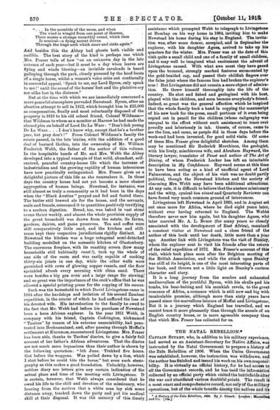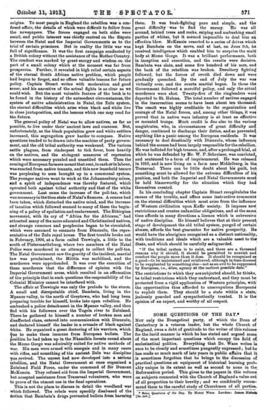THE NATAL REBELLION.* OAPTAIN STUART, who, in addition to his
military experience, bad served as tin Aesistant-Secretary for Native Affairs, wag instructed by the Natal Government to prepare a history of the Zulu Rebellion of 1906. When the Union Gevernment was established, however, the instruction Was withdrawn, and the author has finished And issued his work on his own responsi- bility. It is virtually an official history, for he had aedefill to all the Government records, and he has used the inforrhatieti Collected by an official party villiCh visited the battlefields Afte the war and 'elucidated wirier* doubtful points. the result it a most exact and coniiirebeitaive record, not Only Of the to operations, but of the whole trOubletifig tire natives and itt : • A History of the Zulu Bebollion, that, By J. Stuart ' Jeondati : ht.sem114141 , and Co. [156. origins; To most people in England the rebellion was a con.: fused affair, the details of which were difficult to follow from the newspapers. The fOrces engaged on both sides were small, and public interest was chiefly centred on the dispute between the Natal and the Imperial Governments as to the trial of certain prisoners. But in reality the little war was full of significance. It was the first campaign conducted by a British colony without the assistance of the Mother Country. The conduct was marked by great energy and wisdom on the part of a small colony which at the moment was far from prosperoas. Further, it revealed in high relief certain aspects of the eternal South African native problem, which people had begun to forget, and so offers valuable lessons for future policy. Captain Stuart writes with moderation and good sense, and his narrative of the actual fights is as clear as we could wish. But the most valuable feature of the book is to be found in the history of the antecedent circumstances, the system of native administration in Natal, the Zulu system, the eternal difficulties which arise when black and white live in close juxtaposition, and the lessons which one may read for the future.
The general policy of Natal was to allow natives, as far as possible, to live under their* ancient laws and customs. But, unfortunately, as the black population grew and white settlers increased, this segregation grew harder to compass. Native questions tended to be drawn into the machine of party govern- ment, and the old tribal authority was weakened. The various cattle plagues, from rinderpest to tick fever, bore heavily on the natives, and the stringent measures of repression Which were necessary puzzled and unsettled them. Then the coming of European farmers meant that rent, in cash or in labour, was exacted from native tenants, and this new leasehold tenure was perplexing to men brought up in a communal system. The younger natives went to work at the Johannesburg mines, and a spirit of independenee was thereby fostered, which operated both against tribal authority and that of the white government. Last came the increase of the poll-tax, which was necessary in the then state of Natal's finances. A census had been taken, which disturbed the native mind, and the increase of taxation which followed seemed to many of them the begin- ning of a. policy of spoliation and enslavement. The Ethiopian movement, with its cry of "Africa for the Africans," had attracted many of the more educated and Christianized natives, and strange rumours and prophecies began to be circulated, which were assumed to emanate from Dinnzulu, the repre- sentative of the Zulu royal house. The first trouble broke out in February, 1906, at a farm called Trewirgie, a little to the south of Pietermaritzburg, where two members of the Natal Police were murdered in an attempt to collect the poll-tax. The Natal Government saw the gravity of the incident, martial law was proclaimed, the Militia was mobilized, and the murderers were apprehended. It was over the execution of these murderers that the difference of opinion with the Imperial Government arose, which resulted in an affirmation of the principle that in such questions the responsibility of the Colonial Ministry cannot be interfered with.
The affair at Trewirgie was only the prelude to the storm. A small and disreputable chief, Bambata, living in the Mpanze valley, to the north of Greytown, who had long been preparing trouble for himself, broke into open rebellion. He ambushed a police detachment in the Mpanze valley, and then fled with his followers over the Tugela river to Zululand. There he gathered to himself a number of broken men and disaffected clans, entered into communication with Dinnzulu, and declared himself the leader in a crusade of black against white. He organized a great doctoring of his warriors, which
pas to make them immune from European bullets. The ositibn he had taken up in the Nkandbla forests round about the Mome Gorge was admirably suited for native methods of war. His men were armed with assegais and in many cases with rifles, and something of the ancient Zuln war discipline yas revived. The unrest had now developed into a serious rebellion, and the Natal Government at once organized a Zululand Field Force, under the command of Sir Duncan McKenzie. They refused aid from the Imperial Government, but accepted assistance from Transvaal volunteers, who were to prove of the utmost use in the final operations.
This is not the place to discuss in detail the woodland war which followed. The rebels were speedily disabused of the notion that Bambata's dings preiented bullets from harming them. It was bush-fighting pure and simple, and the great difficulty • was to find the enemy. He was all around, behind trees and rocks, sniping and ambushing small parties of whites, bat it seemed impossible to deal him an effective blow. McKenzie resorted to a series of drives which kept Bambata on the move, and at last, on June 9th, he received intelligence which enabled him to surprise the maid body at Moms Gorge. It was a brilliant performance, both in inception and execution, and the results were decisive.
Bambata was slain, and some five hundred of his men, and the back of the rebellion was broken. Desultory fighting
followed, but the forces of revolt died down and were gradually quenched. By the end of July the war was virtually over, and the courts martial began. In these the Government followed a merciful policy, and only the actual murderers were shot. Twenty-five of the ringleaders were deported to St. Helena. The total number of natives engaged in the insurrection seems to have been about ten thousand: The result was highly creditable to the organization and courage of the Natal forces, and, among other things, it was
proved that in native wars infantry is at least as effective as mounted troops. Much credit is due also to the varioue
magistrates, who, in circumstances of great difficulty and danger, continued to discharge their duties, and so prevented anything like a panic among the European residents. It was necessary to deal drastically with Dinuzulu, whose influence
behind the scenes had been largely responsible for the rebellion.
He was indicted for high treason, and, after a prolonged trial, at which he was defended by Mr. W. P. Schreiner, was convicted,
and sentenced to a term of imprisonment. He was releaaed. in 1910, and is now living on a farm near Middelburg, in the Transvaal. There can be little doubt about hie guilt, but
something must be allowed for the extreme difficulties of his position, and both the Imperial and Natal Governments mus4 be held blameworthy for the situation which they had
themselves created.
In his concluding chapter Captain Stuart recapitulates the
causes of the trouble, and offers some instructive comments on the eternal difficulties which must arise from the influence of Western civilization upon Kaffir society. It imposes nevi, restrictions and creates unfamiliar obligations, and at the same time affords in many directions a licence which is subversive
of native discipline. He himself believes that at their present stage of development the old tribal system, purged of certain:
abuses, affords the best guarantee for native prosperity. He would have the aborigines recognized as a distinct nationality. with traditions and ideals which are a valuable asset to the State, and which should be carefully safeguarded.
" If the tribal system is to exist, and there are a thousand reasons why it should, it should be permitted to nourish and comfort the people more than it does. It should be recognized at a good—to be maintained and reinforced, although in time doomed to be supplanted by something else—not as an evil to be suppressed, by European, i.e., alien, agency at the earliest possible date."
The restrictions to which they are subjected should, he thinks, be tribal restrictions which they understand, and they must be
protected from a rigid application of Western principles, with' the opportunities thus afforded to unscrupulous Europeand to exploit them. They should be a state within a state, jealously guarded and sympathetically treated. It is the opinion of an expert, and worthy of all respect.















































 Previous page
Previous page